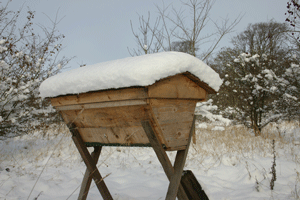-
Bees in decline
There has been a lot of “Buzz” about bees over the last few years, unfortunately all for the wrong reasons or because the bees and other pollinators are in decline and therefore lots of our crops and wild flowers in danger as well.
So far, nobody has come up with a sure answer about “Colony collapse disorder..” or a cure for the varroa mite. But it seems to be quite obvious that the bees are under stress and not doing very well at all. I think there are a number of reasons for this phenomenon:
A A Harmful substances on crops – Pesticides
Nowadays bees are exposed to a number of pesticides, insecticides and fungicides “cide” is another word for death. Unfortunately samples of wax show different levels of various residues of those poisons. As the egg and larvae of the bee is embedded in wax cells it just can’t be very healthy for them. Of course also the honey is stored in these wax cells and is consumed by the bees as well as us. In particular the pesticides containing neonicotinoids are dangerous to the bees (and banned in some countries) as they affect the bees nervous system, which might disorientate the bees.
Be aware that some seeds are covered in insecticides. Some popular products for killing vine weevil, Lawn care products and even some composts for hanging baskets contain harmful products to the bees. IF you buy biodynamic or organic seeds (available at the online shop) you can avoid these substances.
B Bad Diet
We all know how bad an unbalanced diet is for us. The same applies for the bees and with up to 60 % of wild flowers vanished from the countryside, the diet of the bees is very often limited to a few main crops (often sprayed) and not very varied at all. So it should not be a surprise that bees in cities fare better than their relatives in the country side.
C Beekeeping
Honey has been harvested for thousands of years (even found in Egyptian graves) but not until the last years it has been done on a more commercial level. In order to get as much honey from a hive as possible some beekeepers don’t recognize the needs of the bees. Conventional beekeeping adds frames and wired wax foundations to the hive “in order to help the bees” Well it’s actually done to help the bee keeper getting more honey, as the bees are very happy to build their own comb. It is in their instinct to produce wax and they can decide if they are going to build cells for workers or drones (slightly bigger). By taking that instinctive behaviour away from them we don’t help them but actually make them weaker. The same applies to swarming, which is suppressed by modern bee keeping (again in order to help the bee keeper but doesn’t do anything for the bees. It’s against their nature and by constantly intervening in the natural behaviour and NOT recognizing their needs we shouldn’t be too surprised that bees are getting weaker and stressed to the point where their survival is at risk. It is not any different to keeping hens, pigs, cows or other animals under unsuitable conditions. Compare a battery hen to one which is allowed to live a more natural way and then think how we treat the bees! Hardly anything is done to have the bees in mind other than how to get the most out of them.
Lots of bee keepers take too much honey out at the end of summer and supply them with sugar water. It is a lot harder to for the bee to digest, and converting sugar into a honey-like substance is depleting and nutritionally depriving for the bees.
Queen breeding and the importing of foreign Queen bees is normal these days but Rudolf Steiner already warned bee keepers in 1924 that it might be the end for the honey bee if that practice would become the norm. He reckoned that it would take not more than 100 years for the bees to be in serious trouble if queen breeding would go on. Of course he is not here anymore to see his predictions become reality! There are a number of different reasons but one of them is our ignorance towards the needs of bees. Collectively a hive of bees displays remarkably ‘intelligent’ behaviour and sensitive animals deserve better.
Pests
There are a number of pests who attack our local honey bees. Very often the importing of bees from other countries is to blame for introducing these pests to our bees.
If you would like to help the bees, you can plant lots of bee friendly flowers in your garden , buy locally produced honey or donate some money to “Friends of the Bees” http://www.friendsofthebees.org/ or the Natural Beekeeping trust http://www.naturalbeekeepingtrust.org/
If you are interested to build your own top bar hive and learn how to keep bees in them I recommend Phil Chandler’s web site http://www.biobees.com/ People in the South East can learn more about natural Beekeeping from the Natural Beekeeping Trust, based in East Sussex.


